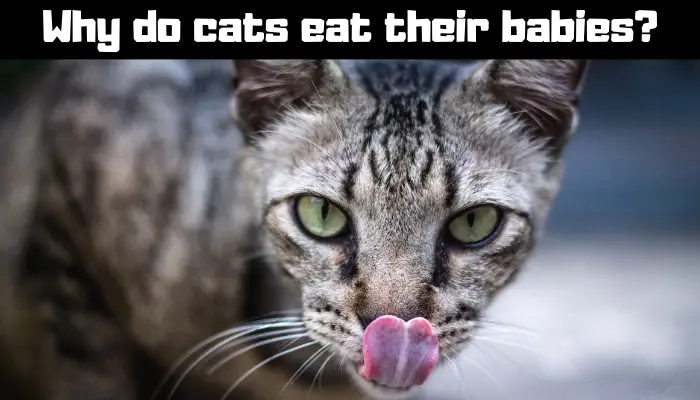If you have seen a newborn kitten missing, you may think some other cats may have eaten that poor baby.
But if the area is secure and no other animals have access to it, you may suspect the mother and ask:
Do cats eat their young? The simple answer to this is yes, cats do eat their young. It may seem brutal and illogical for mothers to eat their young. Yet for cats, it’s an entirely natural and expected behavior. As to why they consume their kittens, there are five primary reasons. These are:
- The newborn kitten is stillborn.
- There are defects on a kitten.
- The cat eats out of mercy.
- The cat feels threatened.
- The cat eats out of malnourishment.
Contents
- 1 The newborn kitten is stillborn
- 2 There are defects on a kitten
- 3 The cat eats out of mercy
- 4 The cat feels threatened
- 5 The cat eats out of malnourishment
- 6 Do male cats eat kittens?
- 7 Can male cats be around newborn kittens?
- 8 What do mother cats do to their young?
- 9 Can you touch newborn kittens?
- 10 Can you stop a cat from eating her kittens?
- 11 Summary
The newborn kitten is stillborn
A mother cat will eat her young if it’s stillborn.
Like human pregnancy, mother cats may give birth to a dead kitten.
There are many reasons why a mother cat’s young would become stillborn, and most of these are due to pregnancy problems.
If a kitten is stillborn, the mother cat will eat it.
While it may not sound good, it’s the best way for the mother to deal with her dead baby. Further, it’s one way for her to get the nutrients she needs to feed and provide for the surviving babies.
You May Also Read – Why do cats eat the heads off mice?
There are defects on a kitten
A mother cat will eat her young if she found that it has congenital disabilities.
A defect is sometimes a sign for mother cats that her kitten won’t survive and live long. Thus, her primary instinct is to eat it.
Even so, remember that not all cats will do. Some of the mother cats won’t eat their young because of defects.
Instead, they simply ignore their babies or kind of like discard them.
The cat eats out of mercy
A mother cat will eat her young out of mercy, especially if she has quite many.
Mother cats know what she is capable of providing. Thus, if she has more kittens than how many she can raise, she will eat a few out of mercy for all.
Through this method, a mother cat shows mercy to the kittens she eats by putting them out of misery due to lack of milk.
At the same time, she also shows mercy to the remaining ones by eating their siblings to provide milk.
Like any other animal, cats have a built-in instinct. Thus, it’s mainly the reason why cats eat babies out of mercy.
The cat feels threatened
A mother cat that feels threatened or in danger may eat her young due to stress and even overprotection.
If a mother cat senses many people and other animals around her, she may view them as threats.
Mother cats tend to be overprotective with their young. Thus, if she feels her kittens are in danger, she will eat them.
Thus, when a cat is giving birth, she should be in a secluded area, away from other pets or even strangers.
The cat eats out of malnourishment
Mother cats who see a malnourished young as a kitten which has no potential to grow and survive. Thus she will eat it.
This kind of problem usually happens to stray cats compared to house cats. The reason is that house cats receive all the nutrients they need through their owners.
The strays, on the other side, would have to get their food.
Like humans, pregnant cats provide for their young. Thus, they need nutrients as much as humans do, especially when giving birth.
Without nutrients, kittens may turn out malnourished, forcing their mother to eat them.
The ones stated above are the primary reasons why a mother cat would eat her young.
Now, you may ask, how would the kittens’ father react? Do the male cats also eat kittens the same as the mothers?
You May Also Read – Why cats eat the heads of rabbits?
Do male cats eat kittens?
The short answer to this is yes, male cats also eat kittens.
Most father cats may be harmless around their newborn babies. Even so, it’s still better to separate them as an extra precaution.
Some father cats eat their offspring to get the mother cats’ attention who are busy taking care of them.
Once they do, they may successfully grab the mother’s attention and agree to mate with them.
Can male cats be around newborn kittens?
When it comes to male cats, it is best to keep them away from newborns, especially from kittens that are not their own.
Most male cats tend to kill and eat kittens that are not their kin.
These cats don’t eat young for food. Instead, they eat the kittens so the mother cat can mate with him, and they’ll have babies of their own.
Thus, try to keep newborn kittens out of sight and reach from male cats.
What do mother cats do to their young?
Aside from eating them, a mother cat may show other behaviors to their young and others. Thus, there’s nothing to worry about if you see a cat or any other cat doing this thing.
While some of these behaviors may look worrisome, they are still normal nonetheless.
Other behaviors of mother cats to their young are:
Frequent Moving of Kittens
One usual behavior or mother cats is that they tend to move their kittens a lot, from one place to another.
This behavior is a sign that the mother cat is not comfortable with a particular area. The reason is that she either feels it’s not a safe place, or there are some threats nearby.
A cat’s perspective is different from us humans. Thus, what may seem as safe for us doesn’t necessarily mean that it looks safe for them as well.
Rejection of a Kitten
While a mother cat may eat a kitten, some just reject them.
Rejection of a kitten is an entirely normal thing for mother cats to do.
Mother cats who give birth to a big litter, like six or more kittens, can’t provide for them. Thus, they tend to reject some out of necessity.
Also, some cats can give birth while suffering from illness or malnutrition. Such cats can’t take care of their young, leading to rejection.
Aggression towards others
One typical behavior for mother cats is their aggression towards others.
A mother cat may not eat her young out of protection. But then, she may hiss, grown, or even attack others that she sees as a threat, be it a human or an animal.
For this reason, approaching a mother cat isn’t a smart move. Keep a certain distance between you and the mother cat. Only approach if she or her babies need immediate attention.
Sitting on a Kitten
A mother cat may sit on a kitten, either intentional or not.
It can be intentional when it is an act of ignoring or rejecting one of her kittens. Thus, a mother cat who refuses her kitten may sit on it and prevent it from feeding.
Another reason may be unintentional, which is due to too much stress for the mother cat. The tension comes from the fact that they have kittens to take care of while not producing enough milk.
Thus, some mother cats injure their kittens by accident. It is terrible, and it happens to most mother cats suffering from stress.
Taking care of kittens requires a lot of energy for mother cats. Thus, they may fall asleep on a kitten without even knowing it.
Since newborn kittens are so small, it can be challenging for the mother to keep track of them.
Now that you know the usual behaviors of mother cats, you may wonder how you can help them.
You may also be curious about the things you can do, especially to the newborn kittens.
You May Also Read – What body parts cat doesn’t eat from the mouse?
Can you touch newborn kittens?
If you are wondering if it’s okay to touch newborn kittens, the answer is Yes. You can handle newborn kittens.
Even so, it’s best not to do so too much, as it can distress a mother kitten.
Many people think that mother cats reject a kitten if a human touches it, and that’s not entirely true.
Mother cats won’t reject a kitten if you touch it. Even so, the best thing to do is to keep a distance from both the kittens and the mother.
Let the mother cat do its job of taking care of her kittens. Only approach if you think they need help.
Can you stop a cat from eating her kittens?
A mother cat rarely eats a baby, and once she does, it’s entirely out of necessity.
Thus, a mother cat’s decision to eat her young is entirely her choice, and it’s really out of our control.
Despite that, you can do some steps to help a mother cat and lessen the chances of eating her kittens. These are:
- Provide a secure area for the cat and her babies.
- Feed your cat some nutritious food.
- Avoid disturbing the mother cat with her young.
- Separate other pets.
- Consult a vet for any problems.
Provide a secure area for the cat and her babies
A secure place for the mother cat and her babies will prevent them from feeling threatened.
Ensure that the place is out of another pet’s reach and that the mother cat may move in and out if she looks for food.
Feed your cat some nutritious food
Proper diet and nutrition are necessary to prevent stillborn and malnutrition.
Feed your cat food that is rich in nutrients she needs for birthing.
After giving birth, place food within the cat’s reach. Do it while keeping a safe distance to avoid distressing the mother.
Avoid disturbing the mother cat with her young
While it is tempting to see and touch newborn kittens, it’s best to keep a distance and watch them from afar.
This step is to ensure that you prevent the mother cat from feeling threatened or stressed.
Separate them from other pets
A mother cat may feel threatened if other animals and even people can approach them.
Thus, if you own other pets, it would be best to keep them in a separate room until the mother cat becomes at ease.
Consult a vet for any problems
Consult a vet if there are problems with the health of the mother cat and her kittens.
By consulting, you’ll receive specific instructions for both the mother and her kittens.
Summary
- Cats eat their babies out of necessity. The primary reasons are:
- The newborn kitten is stillborn.
- There are defects on a kitten.
- The cat eats out of mercy.
- The cat feels threatened.
- The cat eats out of malnourishment.
- Father cats can also eat their kin. Further, other male cats can eat kittens that are not their own.
- Aside from eating, mother cats tend to show other behaviors, both to their kittens and others. These are:
- Frequent Moving of Kittens
- Rejection of a Kitten
- Aggression towards others
- Sitting on a kitten
- It is okay to touch newborn kittens, but it would be best to keep at a distance and only approach when necessary.
- A cat eating her babies is entirely out of human control. But, there are specific steps you can do to lessen the possibility. These are:
- Provide a secure area for the cat and her babies
- Feed your cat some nutritious food
- Avoid disturbing the mother cat with her young
- Separate other pets
- Consult a vet for any problems



